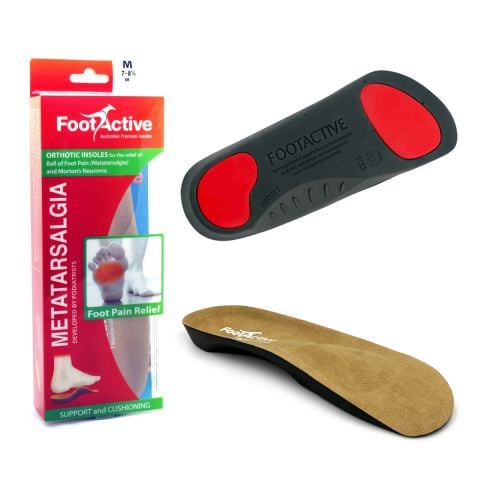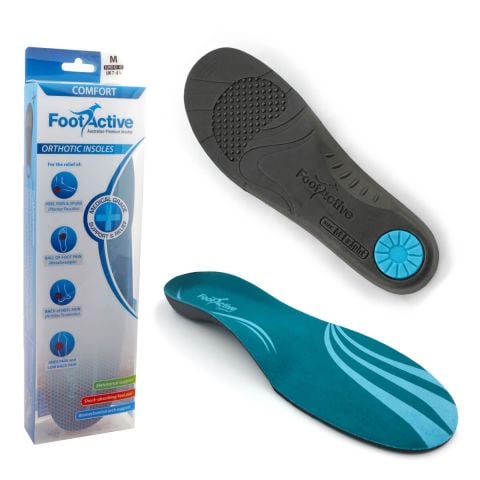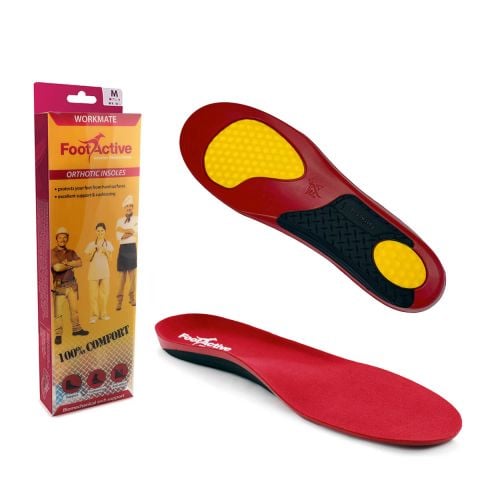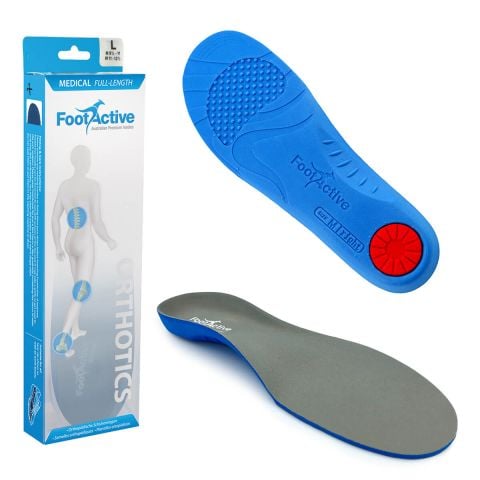Morton’s Neuroma Treatment
Relieving the symptoms of Morton’s Neuroma doesn’t usually require a trip to the doctor. Instead, you’ll find that Morton’s Neuroma treatment is easily done at home. Some of the common treatments to relieve discomfort or pain include:
- Resting and raising your foot when you can.
- Holding an ice pack against the affected area every few hours, for around 20 minutes.
- Taking painkillers, such as paracetamol or ibuprofen.
- Changing your footwear to avoid heels or tight-fitting shoes.
- Weight loss may also help to relieve pain in those who are overweight.
- Purchasing and using orthotic insoles
Orthotic insoles are a simple Morton’s Neuroma treatment that provides support to the foot where needed, preventing the metatarsals from dropping. This helps to reduce and prevent excess squeezing of the nerve, relieving the pain, tingling, numbness and other symptoms associated with Morton’s Neuroma.
While you should avoid high or tight-fitting shoes, if you do need or want to wear ladies fashion shoes with a low to medium height heel, FootActive Catwalk can help reduce the symptoms of Morton's Neuroma by providing the right support and distributing the pressure through your foot.
For normal flat shoes, we recommend FootActive Metatarsalgia as this insole features a metatarsal raise to reduce excess pressure to the ball of your foot. FootActive Comfort features slight metatarsal support and is another option for ball of foot pain.
If the above Morton’s Neuroma treatment options don’t prove successful, you may need to visit your GP. You should visit your doctor if:
- You struggle with normal everyday activity due to severe pain.
- The pain is getting worse or returns.
- You don’t get any relief from pain within two weeks.
- You’re experiencing increasing numbness in the foot.
- You have diabetes – Any foot problems may be more serious when you suffer from diabetes.
Mortons Neuroma FAQs
What is Morton’s Neuroma?
Morton’s Neuroma is a condition where tissue around one of the nerves in our toes start to thicken and ‘squeezes’ the dorsal digital nerve, causing a sharp and burning pain to the ball of the foot, commonly between the third and fourth toes.
What are the symptoms of Morton’s Neuroma?
The first sign of Morton’s Neuroma tends to be a tingling sensation between your toes (usually the third and fourth). Other symptoms of Morton’s Neuroma include:
- Shooting pains in the ball of the foot or base of the toes.
- Feeling like a pebble is permanently in your shoe.
- A burning or numbing sensation in your toes.
- The pain worsens when walking or wearing tight shoes.
What causes Morton’s Neuroma?
Unfortunately, doctors do not know the exact cause of Morton’s Neuroma. They believe it may have something to do with the nerve to the toe being stretched or injured in some way.
Other factors that may increase the likelihood of Morton’s Neuroma are:
- Wearing tight shoes or high heels that apply pressure to the ball of foot and the toes.
- High-impact sports that can cause stress on the feet.
- Having flat feet, high arches or misshapen toes can also increases the chances of Morton’s Neuroma.
How is Morton’s Neuroma diagnosed?
Morton’s Neuroma can be diagnosed by a doctor who has done appropriate examination. If necessary, magnetic resonance imaging (MRI) or ultrasound testing can be used to confirm diagnosis. It is strongly recommended to seek medical advice to determine the best methods of rehabilitation.
Can Morton’s Neuroma get worse over time?
If untreated or treated incorrectly, Morton’s Neuroma can lead permanent nerve damage which can be extremely painful.
What can I do to help Morton’s Neuroma?
If you fear you may suffer from Morton’s Neuroma, it is important to first seek medical advice from your doctor. What they will probably recommend is the following:
- Wearing shoe insoles/pads that reduce pressure to your feet, particularly the ball of your feet. FootActive Metatarsalgia is in insole built with a metatarsal raise, specifically to reduce pressure to the ball of foot.
- Applying a combination of foot massages and ice packs. This again, is to relieve the amount of pressure in the ball of foot. The Moji Foot Pro is a foot massager that can be frozen for an ice massage and is a great tool for this remedy.
- If none of these “DYI” remedies seem to work, your doctor may discuss the possibilities of trying the following:
- Corticosteroid shot: A shot that contains medicine to try and ease the irritated nerve.
- Decompression surgery: A method of surgery whereby areas inside the foot near the affected area are cut. This is done to reduce the amount of pressure on the nerve.
- Cold therapy: Extremely cold temperatures are applied to the irritated nerve, killing some of the nerve cells. This method has a high chance to stop Morton’s Neuroma returning.





